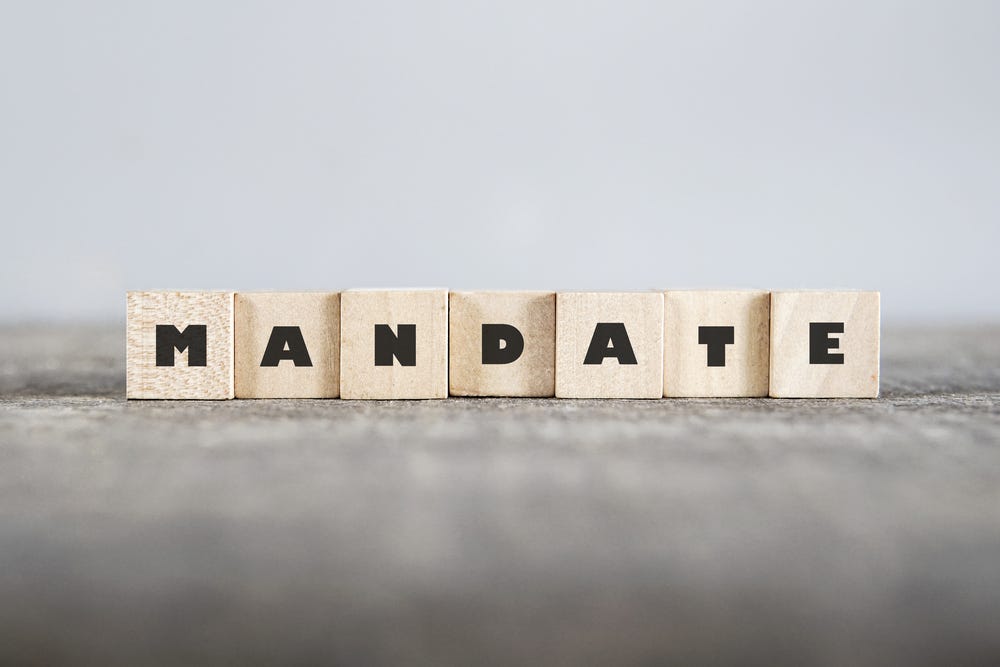E-Pluribus | September 10, 2021
Cancel culture, guilt and humiliation; taking 'women' out of Women's Rights; and President Biden's vaccine mandate.
A round up of the latest and best writing and musings on the rise of illiberalism in the public discourse:
Christophe Van Eecke: The Good Death—Cancel Culture and the Logic of Torture
While some might see comparing “cancellation” to literal torture and execution a bridge too far, Christophe Van Eecke at Quillette explores the underlying motivations behind both. The cooperation of the accused by acquiescing to the mob is often seen as the ultimate goal that confers legitimacy to the grievance that provoked the mob in the first place.
In our current climate of cancellation, the submissive assumption of guilt is performed through the humiliation of the public apology. This is not a coincidence: an apology functions like a confession—it implies acknowledgement of wrongdoing. Even (and especially) if the shamed or cancelled person is innocent of any wrongdoing, the apology is the sacrament that makes the accusation real after the fact. It is the seal that retrospectively authenticates the righteousness of the punitive process. It is the moment when the victim of the cancellation plays his part and willingly goes to his death. To apologize is to die the good death—the accused gives his persecutors the performance they want and need, and validates their worldview.
Yet the display of voluntary humiliation is not enough to make a good execution. The public spectacle of pain (which in cancellations is primarily the psychological pain of humiliation and ostracization), its toleration by society (indicated by the gleeful dissemination of the images of public humiliation), and the exemplary nature of the execution also play their part. To understand the full scope of the impact, we need to expand our frame of reference and approach cancellations as public executions of a very specific kind—they are a public form of torture. It is only when we look at cancellation as a form of torture that the full force of its violence becomes apparent.
Read the whole thing.
Alexandra DeSanctis: The ‘Women’s Rights’ Movement Goes Woke
The women’s rights movement is going through an existential crises: what is a “woman?” At National Review, Alexandra DeSanctis examines the cognitive dissonance that feminists are experiencing trying to square the orthodoxy of the transgender rights movement with traditional feminism.
Since its inception, the legal-abortion movement has centered its argument on a key political narrative: The right to abortion is essential for women’s freedom and flourishing. Legal abortion is a woman’s right, and its restriction is an assault on women.
For decades, this assertion has bolstered their rhetoric. In recent years, though, the argument been considerably muddied by the rising influence of left-wing gender ideologues. According to gender ideology, after all, there’s not really any such thing as a woman — so how could abortion be a matter of women’s rights?
[…]
Progressives now insist that companies such as Tampax and Always must replace the word “women” with “people who menstruate” or “menstruators.” The Biden administration has erased “pregnant women” in favor of the almost unbelievable “birthing persons.” The Centers for Disease Control now uses the only slightly less clunky “pregnant people.” In a nod to gender inclusivity, the Academy of Breastfeeding Medicine last month encouraged the use of the appalling term “chestfeeding.”
Read it all here.
Robby Soave: Biden’s Vaccine Mandate Is a Big Mistake
The debate over public health policy mandates is not new, but the pandemic and the appearance of the Delta variant after the COVID vaccines were introduced is causing the debate to flare up again. Reason’s Robby Soave argues at The New York Times that President Biden’s mandate on private businesses via OSHA is yet another overreach that will not only likely be counterproductive but will further reinforce the perception that executive power is the appropriate way for the government to get things done.
The president’s plan is certainly well intentioned. The vaccines are the only tried-and-true strategy for defeating Covid; government officials should both encourage vaccination and make it easier to get vaccinated. Health officials must continue selling people on the vaccines by emphasizing the considerable upside: Vaccination decreases transmission of the virus and turns hospitalization and death into very unlikely outcomes. It provides such robust protection that 99 percent of coronavirus fatalities in the United States now occur in the unvaccinated population. Vaccination works, and it’s the right option for a vast majority of Americans.
But forcing vaccines on a minority contingent of unwilling people is a huge error that risks shredding the social fabric of a country already being pulled apart by political tribalism.
The president should not — and most likely does not — have the power to unilaterally compel millions of private-sector workers to get vaccinated or risk losing their jobs: Mr. Biden is presiding over a vast expansion of federal authority, one that Democrats will certainly come to regret the next time a Republican takes power. Moreover, the mechanism of enforcement — a presidential decree smuggled into law by the Department of Labor and its Occupational Safety and Health Administration — is fundamentally undemocratic. Congress is supposed to make new laws, not an unaccountable bureaucratic agency.
Read it all.
Around Twitter
Samuel Goldman reacts to a Linda Greenhouse essay in the New York Times:
Bari Weiss lends her Substack to her (potential) future boss:
Wesley Yang on the danger of realizing too late when things go too far:
And finally… privilege or right?












